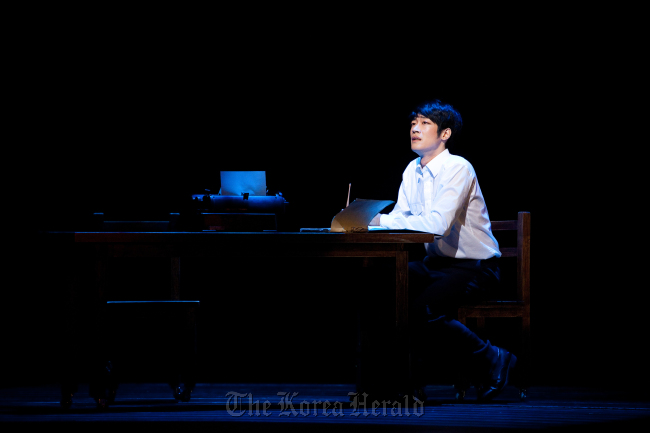‘Yun Dong-ju Shoots the Moon’ offers solid music, strong vocal performance
When the creators of the hit musical “Hero” announced they would be working together for another piece, and that it was going to be about the late poet Yun Dong-ju (1917-1945), many predicted the emergence of another grim, patriotic piece.
What was unveiled on Friday at Seoul Arts Center’s Opera Theater was exactly that, with a number of notable fortes in music, stage design, and vocal performances. The piece’s lack of adequate plot and character development, as well as its overly-patriotic sentiment, were some of its major flaws.
Titled “Yun Dong-ju Shoots the Moon,” the piece’s lyrics were written by the famous “Hero” playwright Han Ah-reum, and its scores by composer Oh Sang-joon. The Seoul Performing Arts Company members performed the piece.
The duo previously told the story of patriot Ahn Chung-gun who lived through the Japanese colonial period in “Hero.” In “Yun Dong-ju Shoots the Moon,” they follow the late poet’s years at Yeonhui Technical School till his death in Japan in 1945 at the age of 27. Yun, who remains one of Korea’s most beloved poets to this day, is recognized for his lyrical and sometimes political-resistant works.
 |
A scene from the Seoul Performing Arts Company’s dance-musical “Yun Dong-ju Shoots the Moon.” (The Seoul Performing Arts Company) |
The Seoul Performing Arts Company is a government-affiliated troupe, and “Yun Dong-ju Shoots the Moon” is a repertoire that very well reflects its identity. The piece screams patriotism and glorifies Yun and his works in the context of nationalism. At times the show feels like government produced material to enlighten the public about the painful history of the Japanese colonial period. And of course, the show was arranged to be staged just a few days before the Liberation Day, Aug. 15. The message is clear.
The show is written based on the widespread assumption that the poet was used as a subject for Japan’s notorious medical experiments while he was imprisoned in Fukuoka, after being arrested for participating in the independence movement for Joseon.
In the show, Yun (played by Seoul Performing Arts Company member Park Young-soo), along with other Korean prisoners, is forcibly injected with an unknown drug by a Japanese. The scene is both graphic and explicit, and is placed in the climax of the show ― making Yun a tragic, patriotic victim. In agony, he cries out the famous poem “One Night I Count the Stars.” The poem, which is widely known for its calm and serene sentiment, feels unexpectedly intense and grim.
Aside from its patriotic qualities, the show had a lot to offer for musical fans. Oh’s original scores, as well as the troupe members’ performance were strong and powerful. Actor Park Young-soo’s vocal performance enhanced the depth and authenticity of the character, as well as the intimacy of the acting. The show was Park’s leading role debut, and he certainly was impressive.
Lee In-ae’s stage design, which well-represented Seoul and Tokyo of the 1930s, was often visually and aesthetically attractive. The piece’s choreography, which is obviously adapted from Korea’s traditional dance movements, also was a notable achievement.
However, many characters are rather flat and simple, especially Seon-hwa, the fictional love interest of Yun. She serves as Yun’s muse, the one who encourages him to write in spite of the turbulent era. But she’s not much of a presence in the piece, mostly due to the spotty script.
It was unfortunate that the show was only given three days for its opening run. Although the piece lacks drama and adequate character development, composer Oh Sang-jun’s beautiful original scores, as well as leading actor Park Young-soo’s strong vocal performance certainly deserve another run in the future.
By Claire Lee (
dyc@heraldcorp.com)








